Introduction To Carob And İts History
Carob, also known as St. John’s bread, is a delicious and healthy alternative to chocolate. This legume tree produces pods that can be pulverized into a powder that can be used as a substitute for cocoa powder. Carob has been used for centuries as a natural sweetener and a remedy for various health conditions. Let’s dive into the history of carob and how it has gained popularity over the years.
The carob tree is native to the Mediterranean region and has been cultivated since ancient times. It was highly valued by the Greeks and the Romans, who used it to make medicine and food. Carob pods were also used as a weight measurement system in ancient times, which was the origin of the carat system used in the jewelry industry today.
Carob became popular as a sweetener during World War II when sugar was scarce. It was used as a substitute for sugar in many recipes, and its popularity continued to grow as people discovered its nutritional benefits. Today, carob is widely used in the food industry as a natural thickener, an emulsifier, and a flavoring agent.
- Carob pods contain natural sugars, including glucose and fructose, which make them an excellent natural sweetener.
- Carob is rich in fiber, antioxidants, and polyphenols, making it a healthy option for those looking to improve their digestion and overall health.
- Carob is also gluten-free, making it a suitable alternative for those with celiac disease or gluten intolerance.
Carob has a long and fascinating history, and it continues to be a popular ingredient in many cultures around the world. In our next blog post, we will explore how carob can be used as a natural sweetener and its benefits for health and wellness.
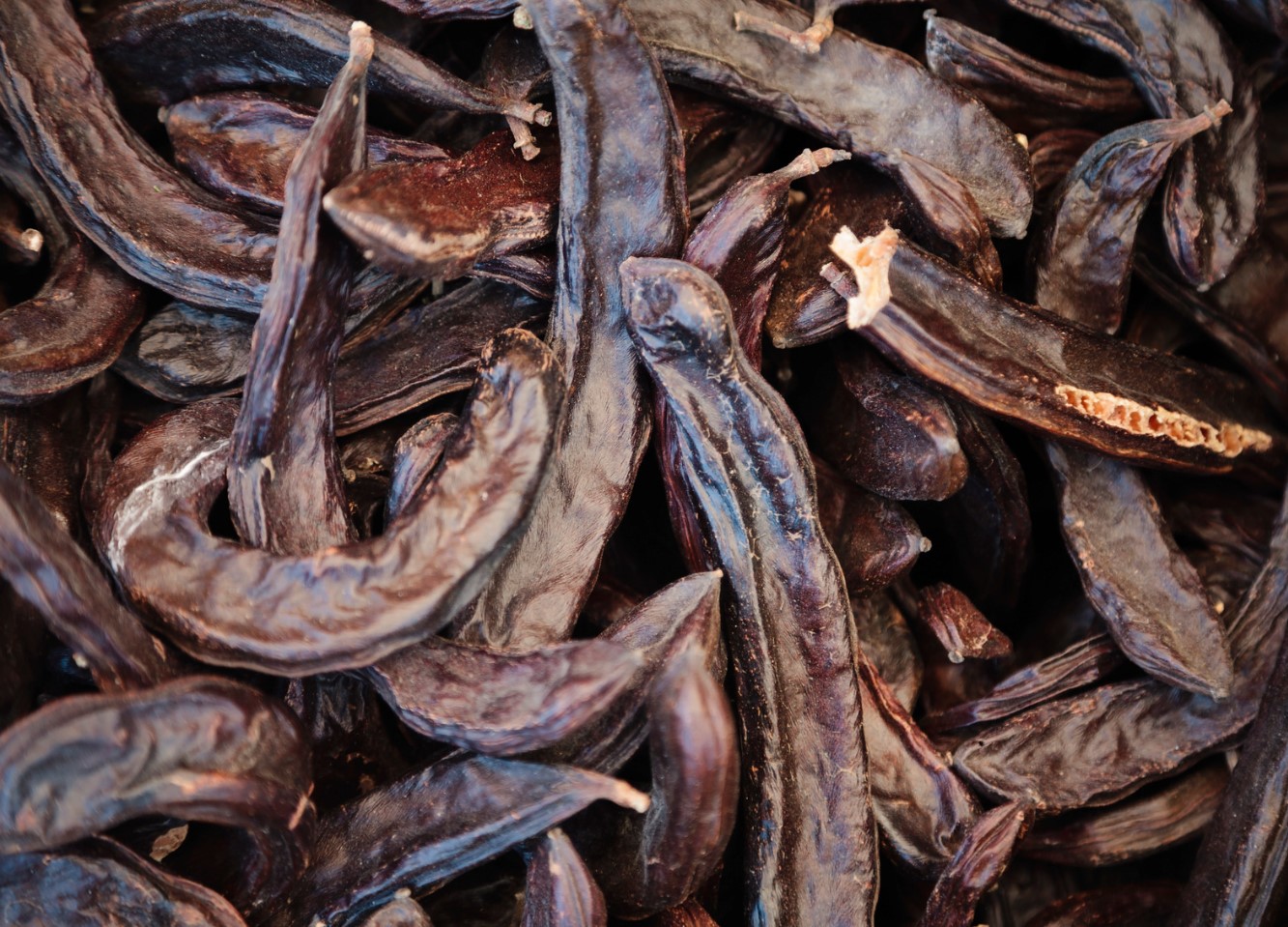
Carob As A Natural Sweetener
Carob is a natural and healthy sweetener that can be a good alternative to sugar. This sweetener comes from the edible pod of the carob tree, a native of the Mediterranean region. Carob powder, which is used as a sweetener, is made by roasting and grinding the carob pods. Unlike sugar, which provides empty calories and contributes to tooth decay and other health problems, carob is a nutritious sweetener that has several health benefits.
Carob is a sweetener that is low in calories and high in fiber, making it an ideal choice for people who are watching their weight. The fiber in carob helps to keep you feeling full for longer, reducing the temptation to snack on unhealthy foods. Additionally, carob is low in fat and contains no cholesterol, making it a heart-healthy choice.
- Carob has a low glycemic index
- It is a suitable sweetener for people with diabetes
- Carob reduces the risk of heart diseases
Using carob as a sweetener can also be a good way to reduce your sugar intake. Carob has a lower glycemic index than sugar, which means that it does not cause a rapid spike in blood sugar levels. This makes carob a suitable sweetener for people with diabetes or those who are at risk of developing the disease.
In summary, carob is a natural and healthy sweetener that has several health benefits. It is low in calories, high in fiber, and has a low glycemic index, making it an ideal choice for people who are watching their weight or have diabetes. Moreover, carob is also suitable for people with allergies to other sweeteners, such as honey or maple syrup. So, if you are looking for a nutritious and tasty sweetener, give carob a try!
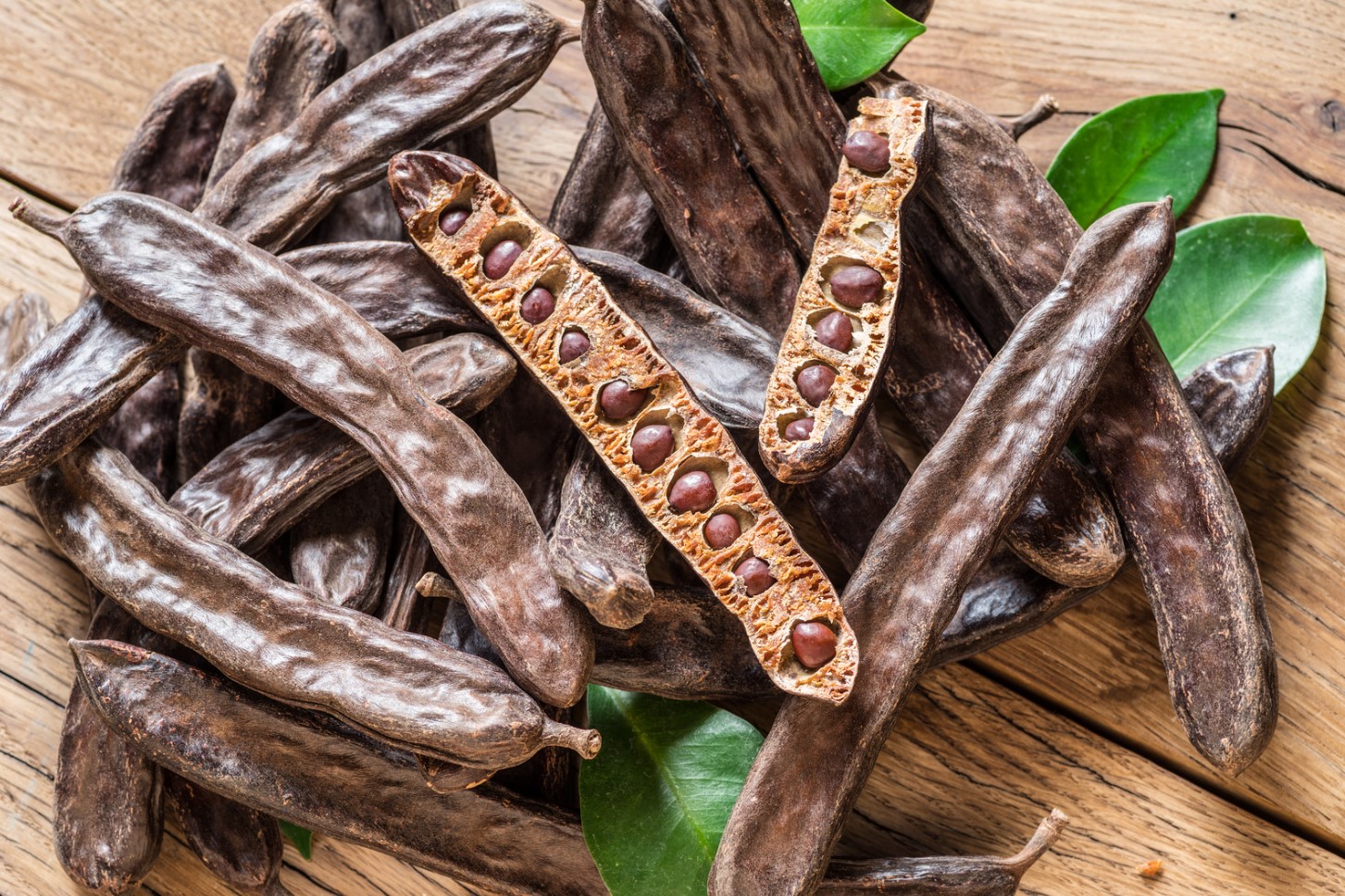
Lowers Cholesterol Levels And Boosts Digestion
Carob is a natural sweetener that has been used for centuries. It is not only delicious, but it also has a variety of health benefits. One of the major benefits of carob is that it can help to lower cholesterol levels and boost digestion.
Cholesterol is a type of fat that is found in the blood. There are two types of cholesterol: HDL, which is good cholesterol, and LDL, which is bad cholesterol. High levels of LDL can lead to a buildup of plaque in the arteries, which can increase the risk of heart disease. Carob contains fiber, which can help to reduce the amount of LDL in the blood. This, in turn, can help to lower cholesterol levels and reduce the risk of heart disease.
- Carob contains pectin, which is a type of soluble fiber. Soluble fiber helps to lower cholesterol levels by binding to cholesterol and preventing it from being absorbed into the bloodstream.
- Carob is also low in fat and contains no cholesterol, making it a heart-healthy alternative to other sweeteners.
In addition to its cholesterol-lowering benefits, carob can also help to boost digestion. Carob contains tannins, which are natural compounds that can help to soothe digestive issues. Tannins are astringent, which means they can help to tighten tissues and reduce inflammation in the digestive tract.
| Benefits of carob for digestion: |
|---|
| Carob can help to relieve diarrhea and other digestive issues. |
| Carob is a natural source of fiber, which can promote regular bowel movements. |
| Carob can help to reduce the risk of colon cancer by promoting the growth of healthy gut bacteria. |
Overall, carob is a nutritious and delicious food that can help to improve your health in a variety of ways. Whether you are looking to lower your cholesterol, improve your digestion, or simply enjoy a tasty treat, carob is definitely worth trying.

High İn Fiber Content And Antioxidants
Carob is a unique and versatile plant that is most well-known for being a natural and healthy alternative to chocolate. However, its benefits extend far beyond just satisfying a sweet tooth. One of the most impressive qualities of carob is its high fiber content, which not only supports a healthy digestive system but also has numerous other health benefits.
Carob is also an excellent source of antioxidants. Antioxidants are crucial molecules that help fight off harmful free radicals and protect our bodies from oxidative stress. Some studies have even demonstrated that the antioxidant activity of carob may be more potent than that of traditional antioxidants like vitamin E.
- These health-promoting properties make carob an ideal addition to any diet. Here are some ways to incorporate carob into your meals:
- Granola: Mix carob chips with oats, nuts, and dried fruit for a tasty and nutrient-packed breakfast.
- Baking: Replace cocoa powder with carob powder in baked goods to reduce the fat content and add some extra fiber.
- Sweetener: Use carob syrup or powder as a healthy and natural sweetener in smoothies or teas.
Incorporating carob into your diet is not only delicious but also a healthy way to maximize your fiber and antioxidant intake. However, it is important to note that carob does contain natural sugars and should still be consumed in moderation.
Carob For Weight Management And Diabetes Control
Carob, also known as algarrobo, is a flowering evergreen tree that grows in the Mediterranean region. The tree produces a pod-like fruit which is harvested and turned into a flour-like substance that is commonly used as a chocolate substitute. In recent times, carob has gained popularity as a natural sweetener and a healthy alternative to traditional chocolate. However, carob has many other benefits apart from just being a sweetener.
Carob is an excellent option for people who are looking to manage their weight or control diabetes. Unlike traditional chocolate, which is high in fat and sugar, carob is low in both of these categories. Carob has a low glycemic index, which means that it does not cause a significant spike in blood sugar levels. This makes it a great choice for people who have diabetes or are looking to reduce their sugar consumption.
Another benefit of carob is that it is high in fiber. Fiber is beneficial for digestion as it aids in moving food through the digestive system. Fiber also helps to keep you feeling full for longer periods of time, which can aid in weight management. Additionally, carob is rich in antioxidants which protect your cells from damage caused by free radicals.
- Carob has a low glycemic index, which makes it a great choice for people with diabetes or those looking to reduce their sugar intake.
- Carob is high in fiber which can aid in digestion and keep you feeling full for longer periods of time.
- Carob is rich in antioxidants which protect your cells from damage caused by free radicals.
| Carob | Traditional Chocolate |
|---|---|
| Low in fat | High in fat |
| Low glycemic index | High glycemic index |
| High in fiber | Low in fiber |
| Rich in antioxidants | Low in antioxidants |
Incorporating carob into your diet is easy. You can use it as a chocolate substitute in your baking, or add it to your smoothies for a natural sweetener. Carob is also a great addition to oatmeal or yogurt bowls for added fiber and natural sweetness. When purchasing carob, ensure that it is pure and not mixed with other ingredients. Store it in a cool, dry location away from sunlight.
While carob is generally safe, it should be noted that consuming large amounts of it may lead to digestive issues such as bloating or diarrhea. Additionally, if you have a sensitivity to legumes, you may want to avoid carob as it is from the same family. As always, consult with a healthcare provider before making any drastic changes to your diet.
Overall, carob is an excellent option for those looking to manage their weight or control diabetes. With its low glycemic index, high fiber content, and abundance of antioxidants, carob should be a staple in every healthy diet.
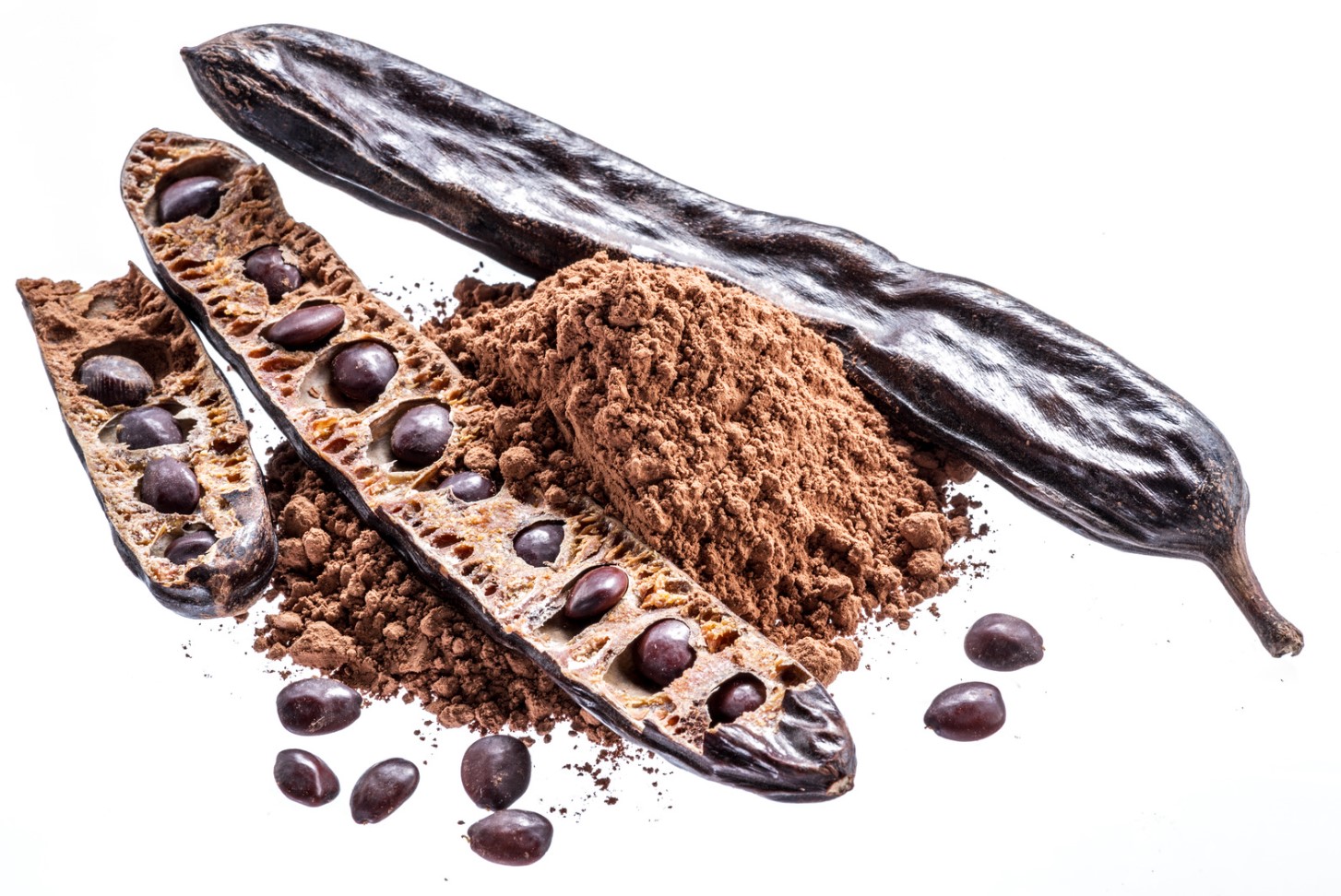
Gluten-free And Suitable For Allergies
Carob is an excellent substitute for chocolate, especially for those who have allergies or are on a gluten-free diet. The carob tree, native to the Mediterranean region, produces pods that are roasted and then ground into a fine powder, which can be used in various recipes. Unlike chocolate, carob is naturally sweet, making it an ideal sweetener for those who want to avoid artificial sweeteners. Also, carob is gluten-free, so those who have celiac disease or gluten sensitivities can enjoy it without any discomfort.
Carob is high in fiber and antioxidants, which makes it an excellent food for overall health. Fiber helps to regulate digestion and prevent constipation, while antioxidants help to protect the body against harmful free radicals. Carob also contains vitamins and minerals such as calcium, magnesium, and potassium, which are necessary for maintaining healthy bones and teeth.
- If you are looking for a healthy snack, try carob chips or chunks. They are available in most health food stores and can be added to trail mix or eaten as is.
- You can use carob powder as a natural sweetener in baking. It can replace sugar and chocolate in most recipes.
- To make carob milk, blend carob powder with water and a sweetener of your choice. Strain the mixture to remove any lumps, and you can enjoy it as a dairy-free alternative to chocolate milk.
| Benefits of Carob | |
|---|---|
| Gluten-free | Carob is free from gluten, making it safe for those with celiac disease or gluten sensitivities. |
| Naturally Sweet | Carob is naturally sweet, making it an ideal sweetener for those who want to avoid artificial sweeteners. |
| High in Fiber and Antioxidants | Carob is high in fiber and antioxidants, which makes it an excellent food for overall health. |
| Vitamin and Mineral Source | Carob also contains vitamins and minerals such as calcium, magnesium, and potassium, which are necessary for maintaining healthy bones and teeth. |
Carob is a versatile and healthy food that can be enjoyed by many people, especially those who have allergies or are on a gluten-free diet. Whether you use it in baking or as a snack, carob is an excellent addition to any diet. However, those with kidney problems should avoid excessive consumption of carob, as it contains oxalates, which can lead to kidney stones.
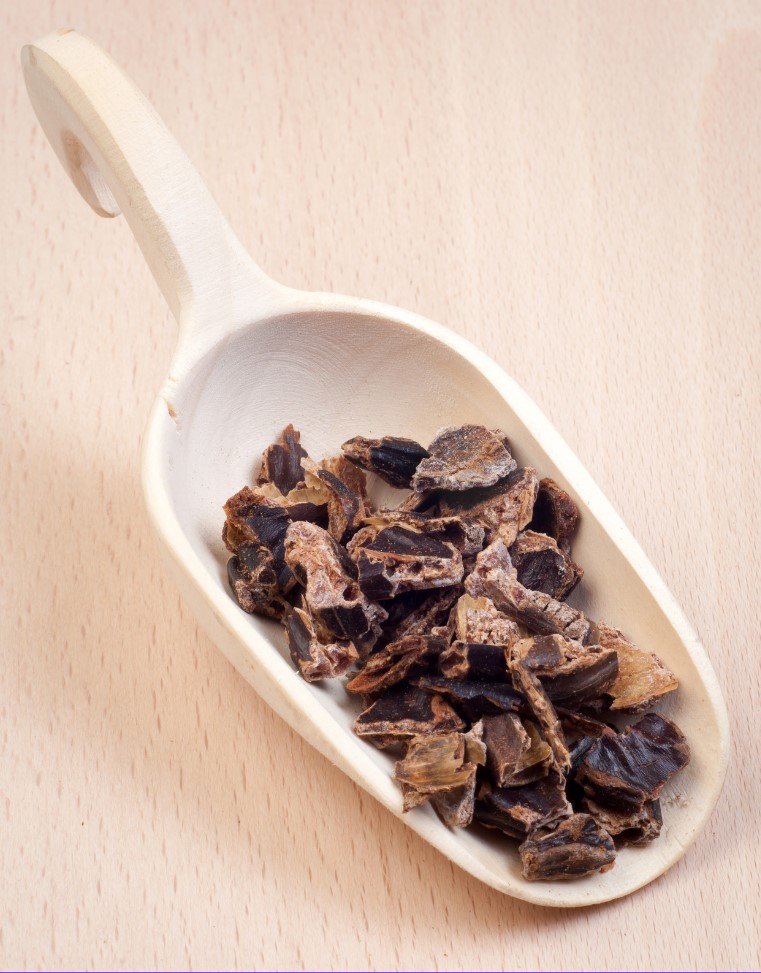
Carob For Healthy Bones And Teeth
Carob is a natural ingredient that is rich in numerous vitamins and minerals. Aside from its sweet flavor, it also has various health benefits that make it a popular choice among health enthusiasts. One of the many benefits of consuming carob is its ability to promote healthy bones and teeth.
Carob is a good source of calcium, which is an essential nutrient that helps in the development and maintenance of strong bones and teeth. Just one ounce of carob powder contains around 56 milligrams of calcium, which is equivalent to 6% of the daily required intake. Additionally, carob also has phosphorus, magnesium, and potassium, which are all vital minerals that contribute to good bone health.
- Phosphorus helps in the regulation of calcium levels in the body and is a critical component of bone mineralization.
- Magnesium aids in the absorption of calcium and vitamin D, which are essential for strong bones and teeth.
- Potassium helps prevent bone loss by increasing calcium retention in the body.
Moreover, carob also contains vitamin D, which is essential for calcium absorption and bone growth. Some studies suggest that carob can help prevent bone diseases such as osteoporosis, which is a condition characterized by low bone density and increased risk of fractures.
| Beneficial Nutrient | Amount per 100g of Carob Powder |
|---|---|
| Calcium | 350mg |
| Phosphorus | 87mg |
| Magnesium | 59mg |
| Potassium | 827mg |
| Vitamin D | 0.1mcg |
One of the benefits of carob over traditional chocolate is that it is caffeine-free. Caffeine can interfere with calcium absorption and contribute to bone loss. Carob is also low in sugar and is a healthier alternative to processed sweeteners that can cause tooth decay and undermine dental health. Carob contains natural sweeteners that are less likely to cause cavities or other dental problems.
Incorporating carob into your diet is easy. You can use carob powder as a substitute for cocoa powder in your baking recipes. You can also try adding carob chips to your trail mix or eating carob-covered nuts as a snack. Drinking carob-based beverages is also an excellent way to get the benefits of carob for your bone and dental health.
Overall, carob is an excellent natural ingredient that offers numerous health benefits. Its high mineral and vitamin content make it an excellent choice for promoting healthy bones and teeth. By incorporating carob into your diet, you can improve your overall health and well-being.
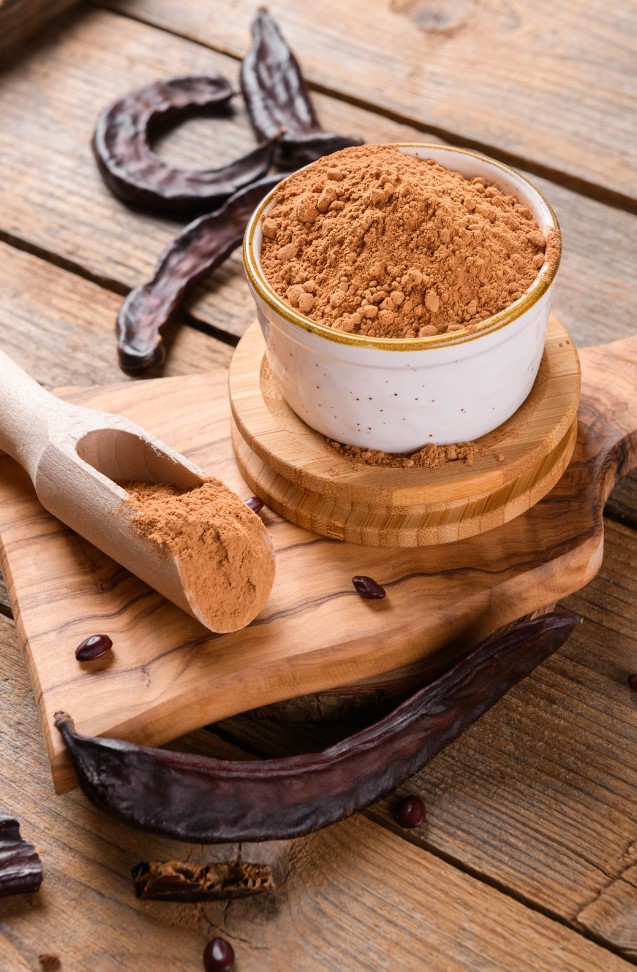
Anti-inflammatory Properties Of Carob
Carob is a well-known plant-based ingredient which is popular for its excellent taste and numerous health benefits. Interestingly, the carob plant has a special property that makes it an effective anti-inflammatory agent, which is an essential quality for maintaining a balanced and healthy life.
The anti-inflammatory power of carob is due to the presence of various naturally occurring compounds like polyphenols and flavonoids. These bioactive components can help to reduce inflammation in different parts of the body, from the digestive system to the circulatory system. Besides reducing inflammation, the polyphenols in carob also possess antioxidant properties that help to protect cells from oxidative stress and prevent various health problems.
Studies have shown that the consumption of carob can be beneficial for individuals who are suffering from chronic inflammation-related diseases like asthma, arthritis, and inflammatory bowel disease (IBD). Since inflammation is one of the root causes of these conditions, consuming carob regularly can greatly help to alleviate symptoms and improve health outcomes.
- Carob is a natural ingredient that has long been used as a remedy for various health issues.
- It has potent anti-inflammatory properties that can help to reduce inflammation in the body.
- Carob contains beneficial bioactive compounds like polyphenols and flavonoids that possess antioxidant properties.
- Carob consumption can be helpful for individuals suffering from chronic inflammation-related diseases like asthma, arthritis, and IBD.
In summary, carob is a versatile plant-based ingredient that offers numerous health benefits. Its anti-inflammatory properties make it an effective remedy for various health issues, and its antioxidant properties help to protect cells from damage caused by oxidative stress. Carob is therefore an excellent choice for individuals looking to improve their health and well-being naturally.
Carob And Brain Health
Carob is a sweet and nutritious substitute for chocolate, making it a versatile ingredient in a variety of recipes. But did you know that incorporating carob into your diet can also improve your brain health?
Antioxidants present in carob help protect brain cells from oxidative stress and reduce the risk of developing age-related cognitive decline. These antioxidants also have anti-inflammatory properties that prevent neuroinflammation, leading to improved brain function.
- Incorporating carob powder into your smoothie or oatmeal is a delicious and easy way to increase your antioxidant intake.
- Carob chips can be a sweet and healthy alternative to traditional chocolate chips in baked goods.
- Snacking on carob-covered nuts or dried fruit can provide a satisfying and nutritious boost during the day.
Furthermore, carob contains high levels of B-vitamins and minerals such as magnesium and iron that support brain health and cognitive function. Magnesium is essential for neurotransmitter production, while iron is necessary for oxygen delivery to the brain.
| Ingredients | Instructions |
|---|---|
| 1 ripe banana | Mash banana in a small bowl |
| 1/4 cup carob powder | Add carob powder to the mashed banana and stir until combined |
| 1 tablespoon almond butter | Stir in almond butter until well mixed |
| 1/2 teaspoon vanilla extract | Add vanilla extract and stir until well combined |
This simple and delicious recipe for carob and banana pudding is packed with brain-boosting nutrients like magnesium and B-vitamins. Serve it as a healthy dessert or snack to support your brain health.
Skin Health With Carob Consumption
Carob is a delicious and nutritious food that has been used for many years to promote healthy skin, among other benefits. This versatile food comes from the carob tree, which is native to the Mediterranean region. In this blog post, we will explore how carob consumption can promote healthy skin and offer tips for incorporating it into your diet.
One of the reasons carob is so beneficial for the skin is its high antioxidant content. Antioxidants are substances that can help to protect your skin from damage caused by harmful environmental factors, such as pollution and UV radiation. Carob is particularly rich in polyphenols, which are a type of antioxidant that has been linked to a range of health benefits.
- Tip: Try adding some carob powder to your morning smoothie or oatmeal for a healthy antioxidant boost.
In addition to its antioxidant content, carob is also high in fiber. Fiber is important for healthy digestion, which can help reduce the occurrence of acne-breakouts and other skin issues. Moreover, carob is a natural sweetener that can be used in place of sugar, which can cause skin inflammation.
- Tip: Substitute carob chips for chocolate chips in your favorite baking recipes or enjoy carob bars as a healthy dessert alternative.
Another way that carob can promote healthy skin is by providing important nutrients that are necessary for overall health. For example, carob is a good source of magnesium, which is essential for healthy bones and teeth. It also contains vitamin E, which can help to protect the skin from damage caused by free radicals.
| Nutrient | Amount per 100 grams of Carob |
|---|---|
| Magnesium | 54 mg |
| Vitamin E | 0.90 mg |
Tip: Look for carob-based skincare products that contain these key nutrients for even more skin health benefits.
In conclusion, carob is a delicious and nutritious food that can promote skin health in many ways. Whether you enjoy it as a sweet treat or add it to your favorite recipes, incorporating carob into your diet is a great way to support overall health and wellbeing.
Carob As A Coffee Substitute
Carob is a great coffee substitute that is making waves in the world of healthy beverages. This naturally sweet product is derived from the carob tree, which is native to the Mediterranean region. Unlike coffee, carob is caffeine-free, making it a great option for people who are sensitive to caffeine or trying to cut back on their intake.
- Carob is also low in fat and contains no cholesterol, making it a healthy alternative to traditional coffee.
- Additionally, carob is high in fiber and antioxidants, which can help to boost digestion and promote overall health.
Carob is often used as a substitute for cocoa in recipes, but its coffee-like flavor makes it an excellent coffee substitute as well. To make a delicious cup of carob coffee, simply mix one tablespoon of carob powder with hot water or milk. Add a dash of cinnamon, nutmeg, or vanilla extract for extra flavor.
| Benefits of Carob As A Coffee Substitute |
|---|
| 1. Caffeine-free |
| 2. Low in fat and cholesterol-free |
| 3. High in fiber and antioxidants |
| 4. Can be used in recipes in place of cocoa |
Overall, carob is a great option for people looking for a healthy and delicious coffee alternative. It is naturally sweet, caffeine-free, and full of health benefits. So next time you’re looking for a warm beverage to enjoy, consider giving carob coffee a try.
Environmentally Sustainable Crop And Versatile Use
Carob is not only a delicious treat, but it’s also environmentally sustainable. Originating from the Mediterranean region, carob trees are easily grown without the use of pesticides or fertilizers. This makes carob a more environmentally friendly crop to grow compared to other crops that require harmful chemicals.
Since carob pods can be used in numerous ways, they make a versatile ingredient. Carob can be used as a substitute in chocolate recipes since it has a similar rich taste, and it is caffeine-free. It can also be used as a natural sweetener in drinks or baked goods.
Additionally, carob is also used in animal feed as a natural protein source. It’s a great alternative to soy or other legumes-rich animal feed. Additionally, carob is used in cosmetics and skincare products due to its skin-healing properties.
| Pro | Cons |
|---|---|
| Eco-friendly | May cause digestive problems in some individuals |
| Versatile | May interfere with medication absorption |
| Nutritious | High in natural sugars and should be consumed in moderation |
Carob’s versatility and sustainability make it an attractive ingredient for eco-conscious individuals. However, it’s important to take precautions before consuming it. Some individuals may experience digestive problems after consuming large quantities of carob. Additionally, it may interfere with medication absorption and should be taken into consideration before consuming carob.
In conclusion, carob is an excellent ingredient to use in cooking or skincare products due to its sustainability and versatility. However, proper precautions and moderation should be taken before consuming carob.
How To Incorporate Carob İn Your Diet
If you’re looking for a natural and healthy sweetener to incorporate into your diet, carob could be the perfect option for you. Not only is carob lower in calories than traditional sugar, but it also has numerous health benefits that make it a great addition to various meals and snacks.
High in fiber content and antioxidants: Carob contains a high amount of fiber, which is essential for maintaining optimal digestive health. In addition, carob is also packed with antioxidants, including polyphenols and flavonoids, which help protect your body from harmful free radicals.
- You can add carob powder to your morning oatmeal or yogurt for a fiber and antioxidant boost.
- You can also use carob chips in your baking recipes in place of chocolate chips for a healthier alternative with less sugar.
Carob for weight management and diabetes control: Carob is a great option for those looking to manage their weight or control their blood sugar levels. Unlike traditional sugar, carob is lower in calories and has a low glycemic index, which means it won’t cause your blood sugar levels to spike and crash.
- You can use carob powder as a sweetener in your coffee or tea instead of traditional sugar to help control your daily calorie intake.
- You can also make a homemade carob protein bar by mixing carob powder with nuts, seeds, and dried fruit, which can be a great snack option for those trying to manage their weight or blood sugar levels.
Gluten-free and suitable for allergies: If you have celiac disease or a gluten intolerance, carob is a great option for you as it is naturally gluten-free. Additionally, carob is also suitable for those with nut, dairy, and soy allergies, making it a versatile ingredient for various diets and lifestyles.
| You can use carob chips or powder as a topping for your gluten-free ice cream or yogurt bowls. | You can also make a batch of carob granola to enjoy as a gluten-free breakfast option. |
With its versatile flavor and numerous health benefits, incorporating carob into your diet has never been easier. Plus, with so many delicious and creative ways to use carob, you’re sure to find a recipe that works for you.
Buying And Storage Tips For Carob
If you’re new to the world of carob, you might be wondering how to store and use this healthy food in your everyday life. Here are some buying and storage tips for carob that will help you make the most of this nutritious ingredient.
1. Choose high-quality carob
When buying carob, make sure to choose high-quality products. Look for organic and non-GMO options that are free from chemicals and additives. You can find carob in various forms, including powder, chips, and syrup.
2. Store carob in a cool, dark place
To ensure maximum freshness and shelf life, store carob in a cool, dry, and dark place. Avoid exposing it to heat, light, and moisture, as this can affect its flavor and quality. You can store carob powder in an airtight container and keep it in your pantry, while carob chips can be stored in the fridge or freezer.
3. Experiment with carob in your recipes
Carob is a versatile ingredient that you can use in many recipes, from baked goods to smoothies and snacks. You can substitute carob for cocoa powder and chocolate chips and get a unique flavor and texture. Carob is also a great natural sweetener that can help you cut down on sugar in your diet.
4. Use carob in moderation
Although carob is a healthy food that offers many benefits, it is still high in calories and carbohydrates, so you should use it in moderation. Overconsumption of carob can lead to weight gain and digestive issues, so it’s best to stick to the recommended serving sizes and enjoy it as part of a balanced diet.
5. Consult your doctor before using carob as a supplement
If you’re planning to use carob as a dietary supplement, it’s essential to consult your doctor first, especially if you have any underlying health conditions or are taking medication. Carob may interact with certain drugs or affect your blood sugar levels, so it’s crucial to get professional advice before adding it to your diet.
By following these buying and storage tips for carob, you can ensure that you get the most out of this delicious and healthy food. Experiment with different recipes and enjoy the unique flavor and benefits of this natural sweetener.
Precautions And Risks Associated With Carob
Carob is a unique plant that has been used for various purposes for many centuries. It is a delicious and healthy alternative to chocolate and a popular ingredient in many recipes. However, like all foods, there are precautions and risks associated with its consumption that you need to be aware of. Here are some things you should know before consuming carob.
1. Allergies
While carob is a suitable alternative to chocolate for those who are allergic to it, some people are allergic to carob itself. Common symptoms of an allergic reaction include swelling of the mouth, tongue or throat, hives, and difficulty breathing. If you experience any of these symptoms, it is essential to seek medical help right away.
2. High in Fiber
Although fiber is beneficial for digestion, consuming too much fiber can cause issues such as bloating, gas or constipation. Consuming excessive amounts of carob can lead to such issues, particularly if you have a sensitive digestive system. Moderation is key, and it is advisable to talk to your doctor or nutritionist about how much fiber you need.
3. Interaction with Medications
Carob contains tannins that can interact with certain medications like aspirin and blood thinners. Therefore, if you are taking any prescribed medications, it’s essential to check with your doctor before you consume carob or any other food with tannins.
4. Carob is not for everyone
Although carob is generally safe, it is not for everyone. Pregnant women are advised to avoid it in large quantities as it can stimulate the uterus and cause contractions. Similarly, individuals with kidney stones or kidney disease should avoid consuming carob as it contains oxalic acid that can further aggravate kidney problems.
- Conclusion
Carob is an excellent alternative to chocolate that has several health benefits. However, like all food items, there are precautions and risks associated with consuming it. The points mentioned above should be kept in mind while consuming carob to avoid any adverse effects. It’s always a good idea to talk to your doctor or nutritionist before incorporating any new food item into your diet.